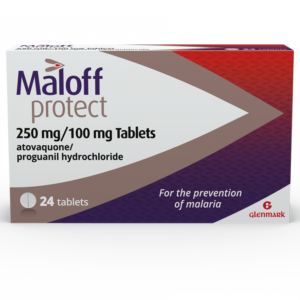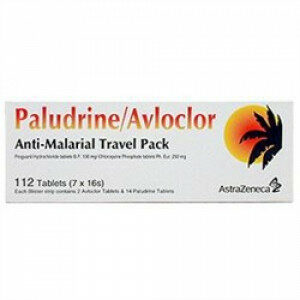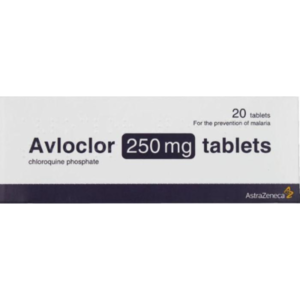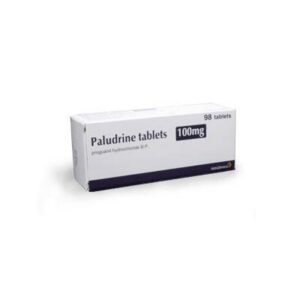Over the Counter Anti-Malarial Medicine
Over-the-counter antimalarial medication serves as a preventive measure for those traveling to areas where malaria is prevalent. It’s essential for travelers to start taking these non-prescription drugs in advance of their trip, continue during their stay, and complete the course after their return, as part of a comprehensive strategy to prevent malaria infection. Read More…

-

Maloff Protect 250mg/100mg Tablets
- Nine tablets plus number of days holiday is required total
- Active Ingredients: Atovaquone And Proguanil Hydrochloride
- Prevent Contraction Of Malaria When Travelling To Tropical Regions
£3.19 Select options -

Paludrine/Avloclor Antimalarial Tablets
- To help prevent malaria.
- Active Ingredient: Proguanil Hydrochloride
- Buy Online With Confidence From UK Registered Pharmacy
£4.89 Select options -

Chloroquine 250mg – 20 Tablets
- To help prevent malaria.
- Active Ingredient: Chloroquine
- Buy Online With Confidence From UK Registered Pharmacy
£15.49 Select options -

Paludrine 100mg Antimalarial Tablets
- To help prevent malaria.
- Active Ingredient: Proguanil Hydrochloride
- Buy Online With Confidence From UK Registered Pharmacy
£3.99 Select options
-
About Malaria
Malaria is a serious disease found mostly in tropical countries, spread by certain types of mosquitoes. It’s significant for its life-threatening potential, yet it’s both preventable and curable. The disease is caused by parasites transmitted through mosquito bites and doesn’t spread directly between people. Those at higher risk include infants, children under five, pregnant women, travelers, and people with HIV/AIDS. Effective prevention strategies are key, as are medicines for those traveling to areas where malaria is common.
-
Symptoms
Symptoms of malaria can appear similar to the flu and typically start 7 to 30 days after being bitten by an infected mosquito. The most common symptoms include:
Fever
Chills or sweats
Headaches
Muscle ache
Extreme tiredness (fatigue)
Upset stomach (nausea)
Feeling unwell (malaise)
Sometimes vomiting, diarrhea, and coughingIn some cases, symptoms can develop much later, even several months or years after leaving a malaria-affected area. It’s important to seek medical attention if you experience these symptoms, especially after traveling to a region where malaria is prevalent.
-
Diagnosis
To diagnose malaria, healthcare professionals use a combination of methods:
Medical History and Physical Exam: A doctor will review the patient’s medical history, including any recent travel to malaria-endemic areas, and conduct a physical examination.
Blood Tests: Blood tests are essential for confirming the presence of the malaria parasite in the blood. These tests can also determine the type of malaria parasite, the severity of the infection, and if the parasite is resistant to certain drugs.
Rapid Diagnostic Tests (RDTs): These tests provide quick results and are particularly useful when microscopic diagnosis is not available. RDTs detect antigens derived from malaria parasites.
Microscopic Examination: This is considered the gold standard for malaria diagnosis. A blood smear is stained and examined under a microscope to detect and identify malaria parasites.
Molecular Diagnosis: Techniques such as polymerase chain reaction (PCR) can detect parasite nucleic acids. While more sensitive than microscopy, PCR is typically not used for immediate diagnosis due to the time required to obtain results.
Serology: Serological tests detect antibodies against malaria parasites. However, they are not used for diagnosing current infections, as they only indicate past exposure.
Drug Resistance Tests: These specialized tests assess the susceptibility of the parasites to antimalarial drugs and are performed in specific laboratories.Early and accurate diagnosis of malaria is crucial for effective treatment and management of the disease.
-
Treatment
Over-the-counter antimalarial treatments are valuable in preventing malaria, especially for travelers heading to regions where the disease is prevalent. These medications work by inhibiting the life cycle of the malaria-causing parasite in the human body, thus preventing the disease from developing.
Here’s a look at how over-the-counter options can assist:
They often contain active ingredients like atovaquone, proguanil, or chloroquine, which are effective against the malaria parasite.
These medications are typically taken before, during, and after a trip to an area with known malaria risk to ensure continuous protection.Some highlighted products that My Pharmacy offers:
Maloff Protect Tablets: These contain atovaquone and proguanil, and they are to be taken daily to prevent malaria, starting 1-2 days before travel and continuing for 7 days after returning.
Paludrine/Avloclor Antimalarial Tablets: This is a combination pack containing proguanil and chloroquine, known to be effective in preventing malaria.
Chloroquine Tablets: A traditional antimalarial treatment that helps prevent the disease by killing the parasites in the blood.
Paludrine Tablets: Containing the active ingredient proguanil, it’s another option for malaria prevention.When considering these treatments, it’s crucial to follow the recommended dosage instructions and also to take additional protective measures against mosquito bites, as no antimalarial drug offers 100% protection. Also, side effects can occur, so it’s important to read the patient information leaflet and consult with a pharmacist if necessary.
-
Prevention Strategies
To prevent malaria, there are several strategies that one can follow. It’s crucial to start by consulting with a healthcare provider, preferably 6 weeks before your trip. Discuss which anti-malarial drugs are suitable for you to take, as these drugs, often referred to as “chemoprophylaxis,” are crucial for prevention. They need to be taken before, during, and after your travels.
Protection against mosquito bites is also vital, especially from dusk till dawn, when mosquitoes are most active. Wearing long-sleeved shirts and pants, using mosquito repellent with DEET, IR3535, or oil of lemon eucalyptus, and treating clothing and gear with 0.5% permethrin are recommended measures. Additionally, ensure that the places where you stay are well-screened or sleep under insecticide-treated nets to prevent bites during sleep.
My Pharmacy provides a selection of these over-the-counter remedies, supporting your health needs with ease and convenience. Incorporating antimalarial tablets into your preventative practices can be an essential step in protecting against malaria. These over-the-counter remedies are conveniently accessible and can be taken following guidance from a healthcare professional or according to the directions provided by the manufacturer. Proactive measures such as eliminating standing water in your vicinity are also key to reducing mosquito populations and your risk of infection.












